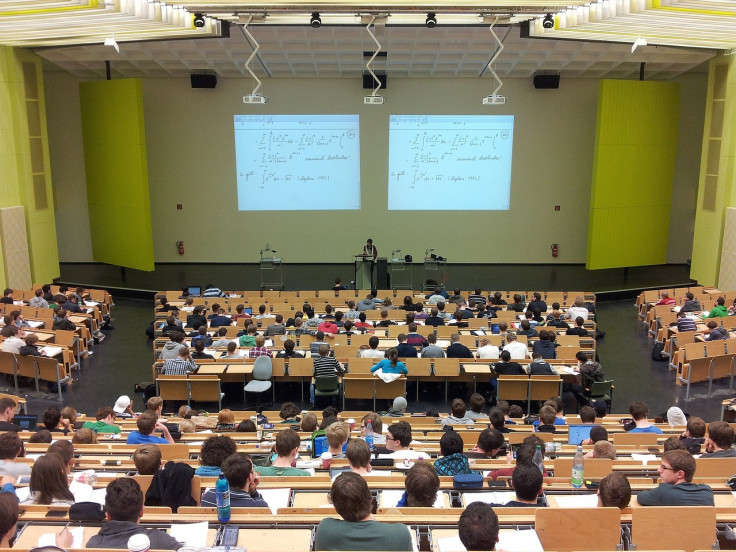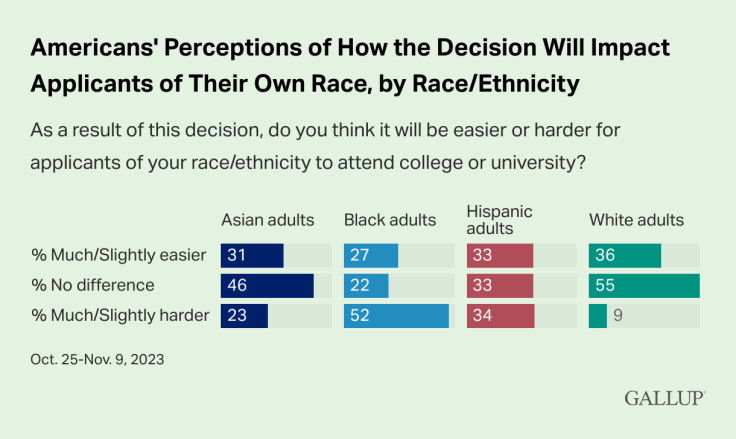
A large majority of Latinos believe that last year's Supreme Court ruling that ended the use of race and ethnicity as criteria for college admissions was "mostly a good thing," according to a new Gallup poll.
Concretely, 68% of Latinos agreed with the mentioned statement, in line with the country average. Whites stood above this figure, with 72% saying this was the case, while Black adults disproportionately disagreed, as 48% said this was "mostly a bad thing."
The study adds that even though Black adults "are divided on the appropriateness of the ruling, they are much more inclined to think it will have a negative than a positive (or no) impact on higher education, generally, and for members of their own racial group."
"About half of Black adults say the ruling will negatively impact higher education in the U.S. (50%) and the ability of applicants of their own race to attend college (52%)," the poll adds.
Latinos, on their end, were more likely to view the decision as positive for higher education in the country but were mixed in terms of the impact it would have in the demographic. For the first question, 45% of respondents said it would have a positive impact, while 22% said it wouldn't have any effect and the remaining 32% said this would be negative.
But answers to the question about impact on Latinos themselves was evenly matched: one third said it would make a large difference, another third that it wouldn't make a difference and the remaining 34% said it would make it slightly or much harder to get into a college.
Most responders from all ethnic and racial groups believe the decision will result in less diversity in campuses, with Asian adults topping the list (57%) followed by Blacks (49%). Latinos gave a more mixed answer, with 36% saying the ruling will make campuses less diverse and 33% saying they would make them more diverse. They were the groups with the most respondents giving this answer.

The impact of the Students for Fair Admissions v. Harvard ruling will begin even before authorities have to make a decision: 43% of Latinos said that the ruling will have "a great deal" or "a fair amount" of impact on their decision about which colleges they might apply to. 48% of Blacks and a staggering 73% of Asian Americans gave the same answer.
Many Latinos' answers could be explained by a larger-than-average enrollment in U.S. colleges. A study by National Student Clearinghouse Research Center showed in October that undergraduate enrollment for the fall 2023 semester saw a 2.1 percent increase compared to enrollment rates in the previous year, while Latino undergraduate enrollment increased by 4.2 percent, twice the national figure.
Latinos are also outpacing other students in enrollment in graduate schools and programs. During the fall 2023 semester, there was a 3 percent increase in enrollment to graduate programs among Hispanic students, while the average enrollment only moved up 0.7 percent.
Despite the increase in enrollment among Hispanic students, there is still a large gap between Latino and White students in regard to graduation rates. According to a report from Excelencia in Education, a Latino-founded and led non-profit organization that promotes Latino education, 48 percent of white adults hold a college degree. In comparison, only 28 percent of Latino adults have a degree.
To close the graduation gap, Latinos would have to earn 6.2 million college degrees by 2030.
© 2023 Latin Times. All rights reserved. Do not reproduce without permission.







